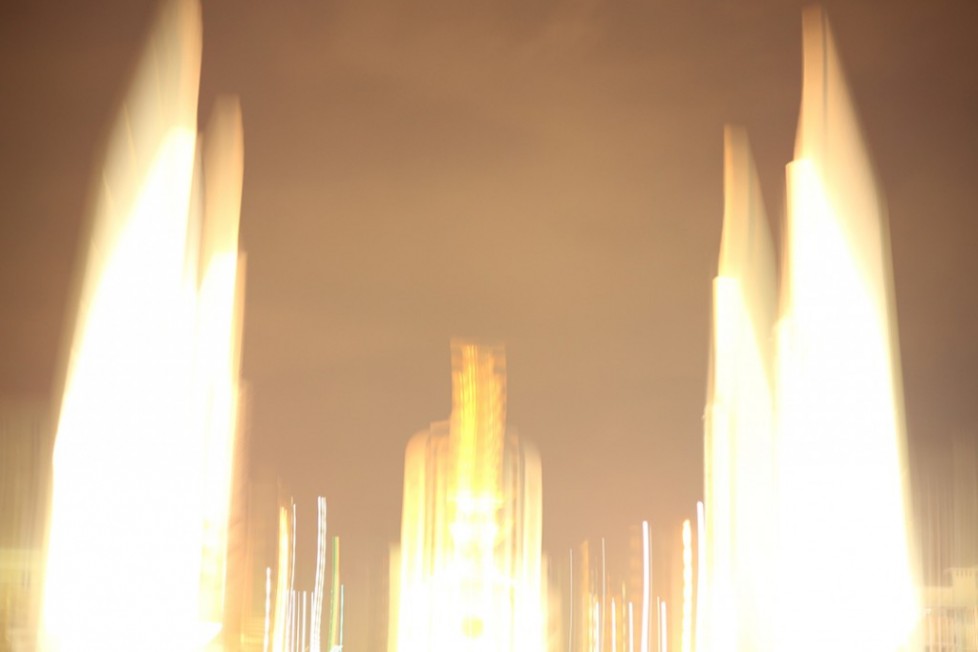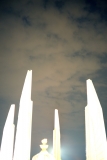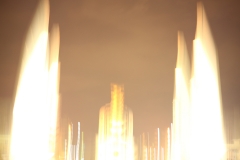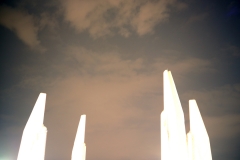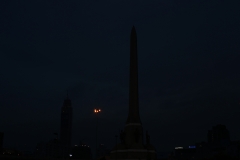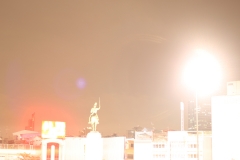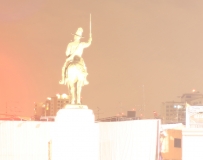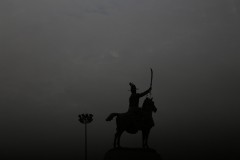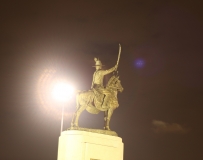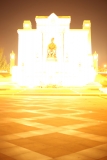Kathmandu Photo Gallery
proudly presents
Project New Visions series 4
Narrative of Monuments
by
Kata Sangkhae
13 January – 24 February 2018
(Opening party on Sat 13 Jan at 6.30 – 9.00 pm)
In the Thai context of waiting for the return to democracy, Kata Sangkhae’s photographs of the Democracy Monument may inspire hope or despair according to the viewer’s interpretation. Against the night sky, at times blurry and then in sharp focus but without detail definition, his non-naturalistic images of blinding light on the golden replica of the constitution upon its golden receptacle, and the monument’s four wings in four directions, convey tall white shapes invocative of disembodied spirits.
Instead of writing a specialised academic treatise on the role and raison d’etre of monuments as repository of collective memory, conceptual artist and doctor of philosophy Kata Sangkhae bravely communicates with the open-ended medium of photography. Amidst the packed metropolis that surrounds and drowns them, how do these monuments endure as important state artifact and device for instilling nationalism, in the new “stooped-over Thai” [Thai Gom Nha] society in which every face is bent over a phone?
Not an exhibition of beautiful photographs to uphold and glorify history lessons and nation-building memories as nurtured by the ruling powers, ‘Narrative of Monuments’ rather reflects the present faded state of those historical memories, represented here by the Democracy and Victory Monuments and King Taksin and King Rama I Memorials, among the artist’s contemporaries.
New Visions curator Manit Sriwanichpoom: “Kata’s clever use of over and under-exposure is taken to a courageous extreme. His choices of distance and perspective, uniquely his own, arouse complex emotions by their unpredictable point of view.”
Kata Sangkhae (b. 1976), artist and lecturer at Bangkok University School of Fine Arts, received a PhD in philosophy from Royal Melbourne Institute of Technology (RMIT), Australia, in 2016. He has regularly exhibited since 2542; most of his work explores issues of nationalism and identity.
(โครงการ ‘จับตา’ ลำดับ 4)
เรื่องเล่าอนุสาวรีย์
โดย
คธา แสงแข
13 มกราคม – 24 กุมภาพันธ์ 2561
(เปิดนิทรรศการ เสาร์ 13 ม.ค. เวลา 18.30 – 21.00 น.)
ช่วงเวลาแห่งการรอคอยกลับคืนสู่ประชาธิปไตยของคนไทย การเห็นภาพถ่ายอนุสาวรีย์ประชาธิปไตยของ คธา แสงแข ก็อาจทำให้ใครต่อใครตีความกันไปต่างๆนานา ทั้งในทางบวกหรือลบ ในแง่มีหวังหรือสิ้นหวัง เพราะภาพถ่ายของเขานั้นดูผิดปกติผิดธรรมชาติ มันสว่างจ้าแสบตาจากแสงไฟส่องตัวพานรัฐธรรมนูญ และปีกประดับทั้ง 4 ทิศ บางครั้งภาพดูสั่นไหว บางครั้งดูคมชัดแต่ไม่มีรายละเอียด เห็นเป็นเพียงเงาร่างสีขาวคล้ายวิญญาณที่ล่องลอยกลางท้องฟ้ายามค่ำคืน
คธา แสงแข ศิลปินเชิงความคิด ผู้สำเร็จปริญญาเอกด้านปรัชญา กล้าหาญที่จะใช้สื่อภาพถ่ายอันเปิดกว้างต่อการตีความ แทนการใช้ข้อเขียนวิชาการที่เฉพาะเจาะจง เพื่อตั้งคำถามต่อบทบาทหน้าที่และการดำรงอยู่ของ “อนุสาวรีย์” ในฐานะ “ความทรงจำร่วม” (Collective memory) ซึ่งถือเป็นประดิษฐ์กรรมสำคัญของการสร้างชาติและแนวคิดชาตินิยมโดยรัฐไทย กับสังคมใหม่ ‘ไทยก้มหน้า’ มองแต่มือถือของตน ท่ามกลางกายภาพเมืองอันแออัดรายล้อมรอบอนุสาวรีย์เหล่านั้น
“เรื่องเล่าอนุสาวรีย์” จึงมิใช่นิทรรศการภาพถ่ายสวยงาม เพื่อเชิดชูบทเรียนประวัติศาสตร์และความทรงจำที่รัฐสร้างขึ้นค้ำจุนความเป็นชาติและการปกครองของตน หากแต่นี่คือความพยายามสะท้อนภาพความทรงจำอันพร่าเลือนของประวัติศาสตร์เหล่านั้นในยุคสมัยปัจจุบันของศิลปิน ไม่ว่าจะเป็นอนุสาวรีย์ประชาธิปไตย อนุสาวรีย์รัชกาลที่ 1 อนุสาวรีย์ชัยสมรภูมิ หรืออนุสาวรีย์พระเจ้าตากสิน
มานิต ศรีวานิชภูมิ ภัณฑารักษ์โครงการ ‘จับตา’ อธิบายจุดเด่นในแง่มุมของการถ่ายภาพ: “คธาฉลาดจงใจเล่นกับการเปิดหน้ากล้องรับแสงให้ผิดพลาด เพื่อให้ภาพดูสว่างจ้าตา หรือไม่ก็ดูมืดไปเลย เป็นโอเว่อร์อันเดอร์ (Over & under exposure) อย่างที่คนส่วนใหญ่ไม่กล้าทำ คธายังเลือกมุมถ่ายภาพระยะใกล้ไกลไม่เหมือนใคร อนุสาวรีย์หนึ่งเขาอาจถ่ายจากหลายๆมุม มีทั้งด้านหน้า ด้านข้าง และด้านหลัง เพื่อให้เกิดอารมณ์ที่หลากหลายอย่างไม่อาจคาดเดาได้”
คธา แสงแข (เกิด 2519) ศิลปินและอาจารย์สอนศิลปะ ม.กรุงเทพ เขาจบปริญญาเอกสาขาปรัชญาจากม.รอยัลเมลเบิร์นอินสติติวต์ออฟเทคโนโลยี (RMIT) ออสเตรเลีย (2559) นับแต่ปี 2542 คธามีผลงานแสดงอย่างต่อเนื่อง โดยผลงานส่วนใหญ่ของเขามักตั้งคำถามต่อประเด็นอัตลักษณ์และความเป็นชาติ


